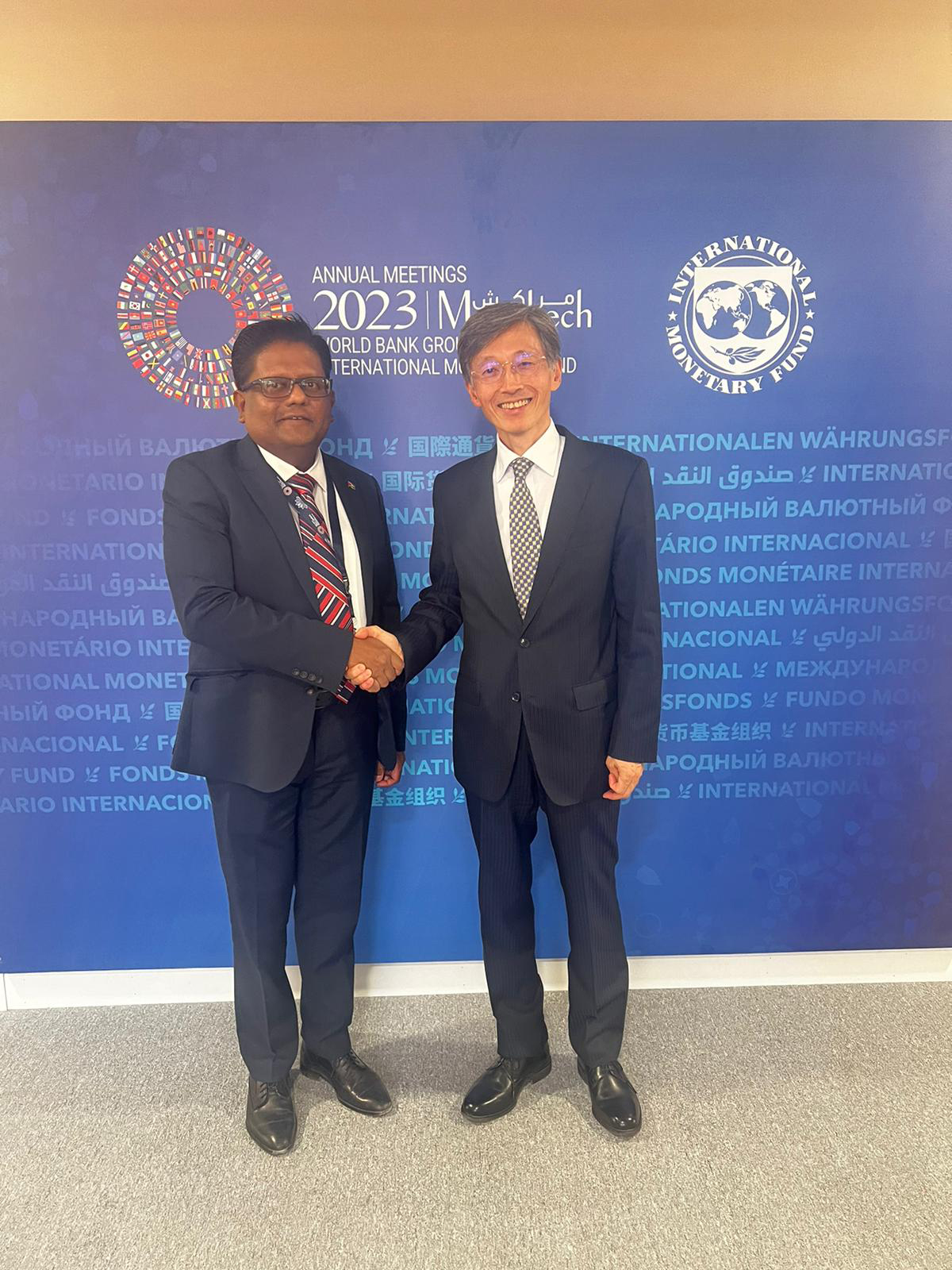As the International Monetary Fund (IMF) and World Bank Group (WBG) meet in Marrakesh, Morocco, Guyana has committed to sustainably manage its economy, which has projections of continuous growth due to the newfound oil wealth, with plans of diversification.
“… Senior Finance Minister Dr Ashni Singh assured IMF’s Deputy Managing Director Mr Kenji Okamura during a meeting, that the Government of Guyana is committed to continued prudent and sustainable management of the country’s economy,” a statement from the Ministry of Finance yesterday said. The 2023 IMF and World Bank Group’s meeting was slated to conclude yesterday.
According to the release, the finance minister said he highlighted that Guyana’s economy recorded real economic growth of more than 40 percent on average per annum over the last three years, with medium term growth projected at more than 20 percent. It added that Oka-mura recognized Guyana’s strong economic performance and economic policy agenda.
But Singh underscored that the way forward for Guyana was creating a successful non-oil economy and made pledges to ensure this was realised, in a prudent, sustainable manner, the release said.
“Our intention is not to be an economy solely dependent on oil. We are using this period to make the strategic investments that are necessary to ensure that in the medium to longer term Guyana is not an economy that is solely dependent on oil. We want to make sure that we have a growing, globally competitive non-oil economy so we are using this period to invest in things like infrastructure to improve connectivity with our neighbours, increase the economic space in which we are operating, and therefore lay the foundation for more trade…” the minister was quoted as saying .
He added as well that as such, the government was working on building out a road to Brazil, a bridge to Suriname, promoting the Caribbean Economic Integration agenda under the Caribbean Community (CARICOM) and fast-tracking initiatives to advance economic integration in specific areas like food security with Guyana having a ‘comparative advantage in areas like agriculture’, the release said.
The Finance Ministry noted the IMF’s recently released Regional Econo-mic Outlook Report for the Western Hemisphere, which said that Guyana should record a 38.4 percent real Gross Domestic Product (GDP) growth rate this year while the country’s growth should continue with an expansion of an expected 26.6 percent in 2024. The report also indicated that Guyana was the only country in which double-digit growth was expected.
“Guyana’s economic circumstances and economic story are very unusual. There are very few relevant comparators for what we are achieving and what we are experiencing in terms of the economic growth and the rapid economic transition that we are going through. There are very few, if any, historic precedents for this kind of growth,” the release quoted the Finance Minister as saying.
Singh, who has been one of the PPP/C’s main campaigners, also used the forum to point to the economic doldrums of Guyana’s past and the role his party played in repositioning the economy. “We come from a time when Guyana was once one of the most heavily indebted poor countries in the world. There was a time when Guyana’s debt to GDP ratio was more than 600 percent and it took hard work to get us from where we were as a Heavily Indebted Poor Country (HIPC) with debt to GDP exceeding 600 percent and debt service to revenue exceeding 100 percent to bring us to a point where our debt to GDP ratio was about 60 percent and that is before we started producing oil,” the release quoted Singh as telling the IMF official.
The release said that he also “reminded that there has been a sustained policy effort by the current administration to ‘open up the economy, to transition it from essentially an economy dominated by government and state activity to an economy that is driven by private investment, both foreign and domestic, that reflects openness, both in terms of openness to external trade and a truly open and competitive private sector economy domestically, and creating the conditions that are necessary to attract big international investors from around the world’.”
Upselling the Low Carbon Development Stra-tegy (LCDS), under which this country is now selling carbon credits to the world, the Finance Minister reminded that Guyana became the first country in the world to get jurisdiction scale certification of its forest and concluded its first sale transaction under the second generation of the LCDS, the release said; Singh credited this to his party.
The IMF said the Boards of Governors of the IMF and WBG normally meet once a year to discuss the work of their respective institutions. These meetings, which generally take place in September/ October, have customarily been held in Washington for two consecutive years and in another member country in the third year.
It said that the meetings bring together central bankers, ministers of finance and development, private sector executives, civil society, media and academics to discuss issues of global concern, including the world economic outlook, global financial stability, poverty eradication, inclusive economic growth and job creation, climate change, and others.






